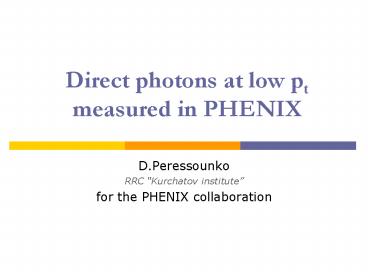Direct photons at low pt measured in PHENIX - PowerPoint PPT Presentation
1 / 20
Title:
Direct photons at low pt measured in PHENIX
Description:
Goal: extract thermal photon spectrum in A A collisions and measure ... Combining this photon with others measured in EMCAL with loose PID cut, estimate ... – PowerPoint PPT presentation
Number of Views:120
Avg rating:3.0/5.0
Title: Direct photons at low pt measured in PHENIX
1
Direct photons at low pt measured in PHENIX
- D.Peressounko
- RRC Kurchatov institute
- for the PHENIX collaboration
2
Outline
- Physics of direct photons at small pt
- pp collisions
- Tagging
- Subtraction
- dAu collisions
- Tagging
- Subtraction
- Internal conversion
- AuAu collisions
- Subtraction
- External conversion
- Direct photon HBT
- Comparison of binary scaled dAu and AuAu
- Conclusions
3
Direct photons at small pt
Prompt photons control the initial state of the
collision, modification of structure functions
etc. Jet-matter interaction test matter
density Thermal photons temperature and
equation of state of the hot matter
e-pt/T
d3N/dyd2pt
Jet-matter
1/ptn
3 GeV
pt
See talk of TadaAki Isobe (Parallel session 3.3)
for high pt photon review.
5 GeV
Goal extract thermal photon spectrum in AA
collisions and measure (effective) temperature.
Need a baseline from pp and pA collisions.
4
Subtraction and Tagging methods
Subtraction
Tagging
- Measure photon spectrum and remove those photons
which make p0 mass with any other - Correct direct photon candidate sample for
contribution from p0 decay photons with missing
partner and for direct photons with fake partners - Subtract contribution from h, w etc. decays
- Measure yield of inclusive photons corrected for
hadron contaminations, conversion, efficiency and
acceptance. - Measure spectrum of p0, h, w etc.
- Calculate yield of decay photons and subtract it
from the inclusive yield.
Ngdir Ngincl - Ngdecay
5
Direct photon spectrum in pp collisions
PbGl
Subtraction
PbSc
Tagging
NLO pQCD CTEQ6M PDF µpT/2, pT, 2pT (by W.
Vogelsang)
Data agrees with pQCD predictions in entire pt
range
Submitted to Phys.Rev.Lett., hep-ex/0609031
More data from Run-5 are coming (already
available for ptgt5 GeV)
6
Direct photon spectrum in dAu collisions
Run-3 dAu
Subtraction (ptlt5 GeV) and tagging (ptgt5 GeV)
methods
Data agrees with pQCD predictions in entire pt
range gt No indication for nuclear
effects
NLO pQCD calculations from W.Vogelsang
7
Internal conversion idea
N.M.Kroll and W.Wada, Phys. Rev. 98 (1955) 1355
Phase space
Part common for all processes
Formfactor (1)
Number of real photons
ee- pair mass
Mass (vs) of the emitting system
Due to phase-space factor we can measure direct
photons in the region where e.g. p0 contribution
is reduced (Meegtmp) and thus increase
Signal/Background ratio 10 times
8
Internal conversion implementation
Fit measured mass spectrum with function
a - absolute normalization b proportion of
direct photons
9
dAu collisions Double ratio
- Internal conversion method provides smaller
systematic errors - But not as small as in the case of AuAu
collisions in Run-4 - (Large background of external conversion on
MVD detector in Run-3)
10
dAu collisions Spectrum
Internal conversion extends range of significant
points to pt gt 2 GeV
Data agrees with pQCD predictions in full pt
range gt No indication for nuclear
effects
11
AuAu collisions External conversion
External conversion
Tagging
- Use external photon conversion in beam pipe to
produce very clean photon sample
- Use very tight PID cut on EMCAL photons to
produce very clean photon sample
no pair cut with pair cut
- Combining this photon with others measured in
EMCAL with loose PID cut, estimate proportion of
photons coming from p0 decays - Correct for missing p0 decay partners
- Subtract h, w, h decay photons
- Calculate ratio Ngall/Ngdecay
Dalitz
Conversion
Uses very pure photon sample
avoid explicit calculation of p0 spectrum
gtreduce systematic errors
12
AuAu collisions, different methods
(QM05)
All three methods produce consistent results and
comparable systematic errors.
See posters (87) of Hijiang Gong and (88) of
Takao Sakagutchi
13
Comparison AuAu Minimum Bias
gtSystematic errors are still too big to extract
thermal photons. gtThere is room for thermal
photons
Direct photon spectrum measured in dAu
collisions and scaled with ltNcollgt agrees pretty
well with spectrum measured in AuAu at high pt
14
Comparison AuAu, central collisions
- Systematic errors are still too large to extract
thermal photons. - There is room for thermal photons
This is consistent with excess above pQCD
reported previously
Spectra agree within errors in entire pt range
15
Direct photon HBT
3/2
1/Rdecay 1 eV
- Only direct photon correlation
- matters (Rgdecay108 fm)
- Size of emitting region can
- be extracted
- Proportion of direct photons can be evaluated
from the correlation strength parameter - Distortion of two-photon correlation function
- Apparatus effects
- Contamination by (correlated?) hadrons
- Contamination by photon conversion on detector
material - Background photon correlations
l
1
q
See poster (111) of Dmitri Peressounko for
details
16
Two-photon correlations
e
g2
g2rec
g1
g1
e-
- External conversion
- No close cluster interference
- No hadron contamination
C2 calculated in EMCAL and convertedEMCAL agree
gt both effects are under control
17
Conclusions
- Measurement of direct photon yield at small pt is
very interesting but extremely complicated task - PHENIX has developed a variety of methods for
direct photon extraction in pp, dAu and AuAu
collisions producing consistent results - Because of the large systematic errors comparison
of binary scaled dAu spectrum with AuAu does
not allow to make a statement on the origin of
the excess above pQCD observed in AuAu. - More precise data are coming
18
Backup slides
19
Internal conversion implementation
20
Comparison to Subtraction AuAu results































